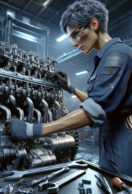Hot weather can significantly impact the performance and longevity of your diesel engine, presenting a range of challenges that require careful consideration and proactive maintenance. As temperatures soar during the summer months, diesel engines face unique obstacles that demand special attention from vehicle owners and operators. The increased heat can have far-reaching effects on various aspects of engine function, including fuel efficiency, engine cooling systems, and overall performance. High ambient temperatures can cause diesel fuel to expand and vaporize more readily, potentially leading to reduced fuel economy and increased emissions. Additionally, the engine's cooling system is put under greater stress as it works harder to maintain optimal operating temperatures. This increased workload can lead to accelerated wear on components such as water pumps, radiators, and coolant hoses. Furthermore, the heightened thermal stress can affect the engine oil's viscosity, potentially compromising its ability to provide adequate lubrication and protection to vital engine parts.
Overheating
One of the primary concerns in hot weather is the potential for overheating, particularly in diesel-powered vehicles. Diesel engines, due to their higher compression ratios and energy-dense fuel, generate significantly more heat than their gasoline counterparts, making proper cooling absolutely essential for optimal performance and longevity. This increased heat production puts additional stress on the engine's cooling system, necessitating extra attention and maintenance during periods of elevated temperatures. To safeguard your diesel engine against overheating, it's crucial to ensure that your cooling system is in top condition. Begin by checking the coolant levels regularly, as low coolant can quickly lead to overheating issues. Use a coolant tester to verify that the mixture is correct and that it hasn't degraded over time. Next, thoroughly inspect all hoses for signs of wear, such as cracks, bulges, or softness, as these can indicate imminent failure. Replace any hoses that show these warning signs to prevent unexpected breakdowns. Additionally, it's vital to verify that the radiator is clean and unobstructed. Over time, debris like insects, leaves, and road grime can accumulate on the radiator's surface, reducing its ability to dissipate heat effectively. Regularly clean the radiator's exterior using compressed air or a gentle water spray, being careful not to damage the delicate fins. Also, check for any bent or damaged fins, which can impede airflow and reduce cooling efficiency.
Fuel Systems
Fuel quality emerges as another crucial consideration during periods of elevated temperatures, particularly for diesel-powered vehicles and equipment. The scorching heat of summer can accelerate the degradation process of diesel fuel, potentially leading to a cascade of engine-related complications. As temperatures rise, the chemical composition of diesel fuel can undergo changes, resulting in the formation of deposits and sediments that may accumulate in the fuel system. This degradation process can have severe consequences, most notably the clogging of vital components such as fuel filters and injectors. When these essential parts become obstructed, it can lead to reduced engine performance, decreased fuel efficiency, and in extreme cases, engine failure. To combat these heat-induced issues, vehicle owners and fleet managers should implement a proactive maintenance strategy. Regular fuel filter changes serve as a primary defense against fuel system contamination. By replacing filters at manufacturer-recommended intervals or even more frequently during hot weather, operators can ensure that their engines receive clean, unobstructed fuel flow. Additionally, opting for high-quality diesel fuel from reputable sources can significantly mitigate the risk of heat-related fuel degradation. Premium diesel fuels often contain additives designed to enhance stability and resist breakdown under high-temperature conditions.
Summer Diesel Maintenance
Proper diesel maintenance becomes even more crucial in summer, as the intense heat can place additional stress on various engine components. This heightened importance stems from the fact that high temperatures can accelerate wear and tear on critical parts, potentially leading to reduced performance or even engine failure if not addressed promptly. One of the most essential aspects of summer diesel maintenance is regular oil changes. Engine oil plays a vital role in lubricating and cooling the engine's moving parts, but it can break down faster in hot conditions. The elevated temperatures cause the oil to thin out more quickly, reducing its effectiveness in protecting engine components. Therefore, more frequent oil changes may be necessary to ensure optimal engine protection and performance during the summer months. Additionally, it's imperative to pay close attention to your engine's air intake system during the warmer season. Hot weather often coincides with increased levels of dust, pollen, and debris in the air, which can rapidly accumulate in air filters. These contaminants can clog air filters more quickly than usual, restricting airflow to the engine and potentially causing a decrease in fuel efficiency and power output. Regular inspection and replacement of air filters become even more critical during this time to maintain proper engine function and prevent potential damage from inadequate air supply.
Summary
By comprehending the various impacts of elevated temperatures on your diesel engine and implementing proactive maintenance measures, you can safeguard your vehicle's performance and longevity, even during the most scorching summer months. High ambient temperatures can affect multiple components of a diesel engine, including the cooling system, fuel system, and lubrication. For instance, excessive heat can lead to increased evaporation of diesel fuel, potentially causing vapor lock and reduced engine efficiency. Additionally, engine oil may become less viscous in hot conditions, potentially compromising its protective properties. To mitigate these effects, regular maintenance becomes crucial. This includes ensuring proper coolant levels and quality, inspecting and replacing air filters more frequently to combat increased dust and debris, and potentially upgrading to a higher-viscosity oil suitable for hot weather operation. By staying vigilant and addressing these factors, you can maintain optimal engine performance, fuel efficiency, and reliability, regardless of the challenging thermal conditions your vehicle may encounter during peak summer periods.
At All in the Wrist Diesel and Auto Repair in Albuquerque, we can help you with all areas of your diesel engine maintenance and repair, contact us to set an appointment.




